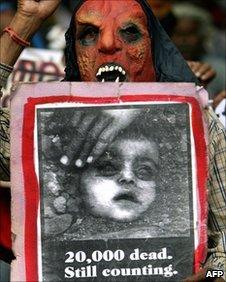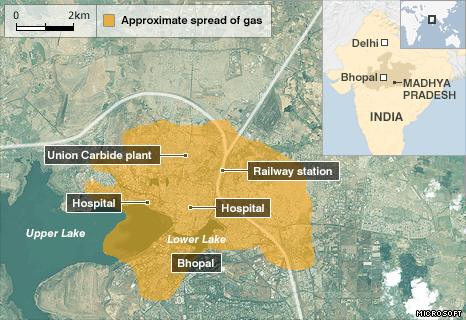Bhopal: India wants compensation doubled
- Published

A masked protester says the effects of the gas leak are still felt to this day
India is seeking to more than double to $1.1bn (£700m) the compensation paid by a US chemical company for the 1984 Bhopal gas disaster.
The attorney general's office has filed a case at the Supreme Court to increase the $470m settlement reached in 1989.
The petition coincides with the 26th anniversary of the disaster.
Thousands of people died after the leak from Union Carbide's plant in the Madhya Pradesh state capital.
In June, an Indian court finally convicted seven former managers at the plant, handing down minor fines and brief prison sentences.
But many victims and campaigners have felt justice has still not been served against Union Carbide.
Dow Chemicals, which bought Union Carbide in 1999, has said in the past that the $470m settlement was fair and final.
The Indian government says some 3,500 people died within days of the gas leak and more than 15,000 in the years since.
Campaigners put the death toll as high as 25,000 and say the effects of the gas continue to this day.
The Indian government petition states: "The Supreme Court determined the $470m settlement on 14th/15th February 1989.
"The settlement is based on certain assumptions of truth and if these assumptions of truth are unrelated to the realities, then elements of the settlement's justness would be seriously impaired."
Correspondents say the petition is being viewed as a serious attempt by the government to redress the settlement, although it is not clear how long a ruling will take.
A lawyer from the attorney general's office on Friday told AFP news agency on condition of anonymity: "This time we are seeking maximum compensation for the victims of the gas disaster."
The site of the former pesticide plant is now abandoned.
It was taken over by the state government in 1998, but environmentalists say poison is still found there.
In August, there was uproar in India after a senior US official was accused of making a veiled threat to block a World Bank loan to Delhi over the Bhopal leak issue.
In an e-mail, he noted "we are still hearing a lot of noise about the Dow Chemical issue", and appeared to warn of a potential "chilling effect on our investment relationship".

- Published8 November 2010
- Published20 August 2010
- Published8 June 2010